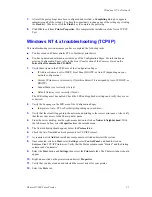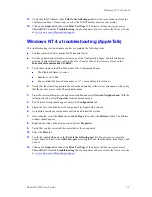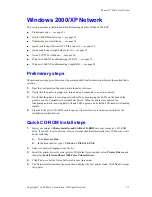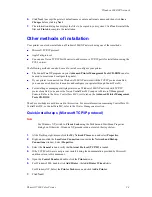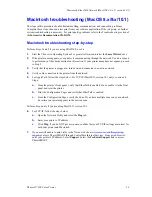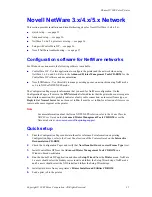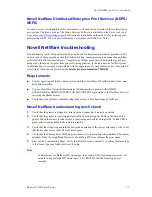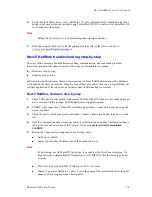
Macintosh EtherTalk Network (MacOS 8.x/9.x/X, version 10.1)
Phaser® 7300 Color Printer
33
Quick install steps for MacOS X, version 10.1
Requirements
Ensure that you are running MacOS X, version 10.1. The previous versions of MacOS X does not fully
support PostScript printing and printer features.
Setting up the Macintosh Ethernet port for
TCP/IP or AppleTalk
If your Macintosh is not already set up for TCP/IP, perform the following procedure:
1.
From the
System Preferences
application, select
Network
. Select
TCP/IP
.
2.
From the
Active Ports
menu, check
Built-In Ethernet
.
3.
From the
TCP/IP
tab, specify how you will obtain the IP address:
Manually
or by
DHCP
.
4.
If you select
Manually
, specify the IP address in the dialog box. You also need to enter
information for the Subnet Mask, Router Address, and Name Server Address.
5.
If you wish to use
AppleTalk
,
select the
AppleTalk
tab and ensure the
Make AppleTalk Active
box is checked.
6.
Close the dialog box.
Creating an LPR printer with MacOS X, version 10.1
1.
Open the
Print Center Utility
. (This Apple utility is usually found in a directory called
Utilities
in the
Applications
directory.)
2.
Select
Add Printer
, then select
LPR Printers Using IP
from the pull-down menu.
3.
In the
LPR
Printer’s Address
field, enter the printer's IP address or host name.
4.
In the
Queue
field, enter
PS
(all upper-case). Click
OK
.
5.
Under the
Printer Model
pull-down menu, select the appropriate PPD from the list. If your
printer’s PPD is not listed, install it from the printer’s
Printer Installer and Utilities CD-ROM
.
6.
Click
Add
to complete the configuration
.
Creating an AppleTalk printer with MacOS X, version 10.1
1.
Ensure that
AppleTalk
is enabled in
System Preferences
.
2.
Open the
Print Center Utility
. (This Apple utility is usually found in a directory called
Utilities
in the
Applications
directory.)
3.
Select
Add Printer
, then select
AppleTalk
from the pull-down menu.
4.
Select the appropriate zone.
5.
Choose your printer from the list provided
.
6.
Under the
Printer Model
pull-down menu, select the appropriate PPD from the list. If your
printer’s PPD is not listed, install it from the printer’s
Printer Installer and Utilities CD-ROM
.
7.
Click
Add
to complete the configuration
.



